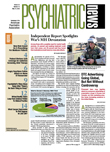Prisoners will get help read-justing to society after their release from prison under a recently signed federal law. The assistance also will include substance abuse and mental health screenings.
The Second Chance Act (HR 1593), which APA supported, was signed by President Bush on April 9. The measure, sponsored by Rep. Danny Davis (D-Ill.), will support a full continuum of care for treatment of former inmates for substance use disorders. Additionally, the law supports mental health screening and treatment and provides grants for family-treatment programs. The bill also reauthorizes and expands some existing prisoner rehabilitation programs.
“Many leave prison to return to the same environment that saw them offend in the first place,” Davis said in a written statement.“ But, as they return, they often face additional barriers to reentry: serious physical and mental health problems, no place to stay, and lack of education or qualifications to hold a job.”
The result of this situation, he said, is that two-thirds of the 650,000 offenders released every year are rearrested for new crimes within the first three years after their release. Youth offenders are even more likely to offend again.
The potential beneficiaries of the Second Chance Act are numerous, as chronicled in a 2006 report by the Department of Justice titled “Mental Health Problems of Prison and Jail Inmates.” The report concluded that more than half of the population incarcerated in U.S. prisons and jails—including 56 percent of state prisoners, 45 percent of federal prisoners, and 64 percent of local jail inmates—had a mental illness. Many of those inmates suffered from treatable disorders, such as major depression, bipolar disorder, and substance use disorders.
The challenges for ex-prisoners are not eased by corrections departments, one-third of which provide no services to released offenders. Most departments do not offer a transitional program, which places a heavy burden on families and communities, Davis said.
The annual financial cost of incarceration and the social and economic costs of crime led Davis to conclude that postincarceration programs that aim to reduce recidivism are “just common sense.”
The law will cost about $400 million from 2008 to 2012, including $181 million for Department of Justice grants for programs to improve mental health treatment for inmates and help offenders reenter communities after they have served their sentences, according to the Congressional Budget Office. In addition, $10 million will be required annually to fund Bureau of Prisons activities to prepare prisoners for successful reentry into the community.
An unspecified amount will be provided through grants to state and local governments to help them develop drug-treatment programs for offenders, which would serve as alternatives to imprisonment.
Among the first to urge legislation to provide postincarceration support were psychiatrists from Davis's district in Chicago. Several psychiatrists serve on his Mental Health Advisory Committee, and they supported the legislation as a way to “decriminalize” mental illness, according to advisory committee chair Kenneth Busch, M.D.
Busch, who is also chair of the Governmental Affairs Committee of the Illinois Psychiatric Society, said the bill resulted from grassroots support by psychiatrists and mental health professionals and members of the public concerned about the problem of incarcerating people with mental illness, including substance use problems. He described the nation's prisons as the largest psychiatric hospitals in the nation.
“These people are untreated and then released and have nowhere to go,” Busch said. “It's a national tragedy that we don't address this through wraparound services.”
Many prisoners released with substance use problems have other mental disorders; however, they are unable to afford the care they need, and without that care they cannot become employed and self-supporting, according to a 2005 report on prisoner-reintegration challenges by the Annie E. Casey Foundation.
In addition, resources for former inmates could ultimately improve overall public safety by reducing crime linked to drug use and untreated mental illness. That dovetails with the ultimate goal of the legislation, which is to help ex-inmates become independent, contributing members of society, Busch said.
The Second Chance Act can be accessed at<http://thomas.loc.gov> by searching on the bill number, HR 1593. ▪
